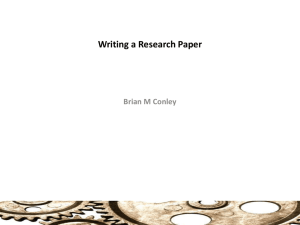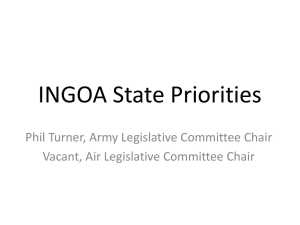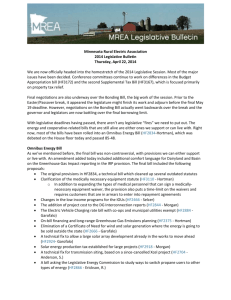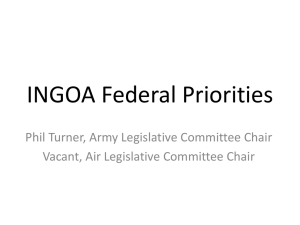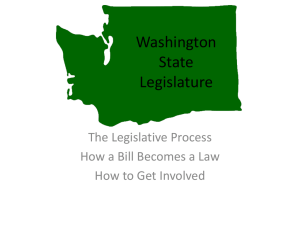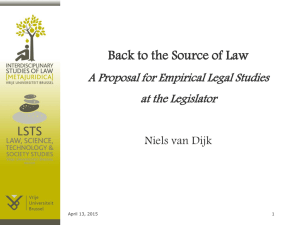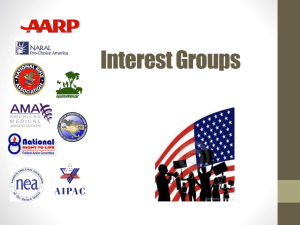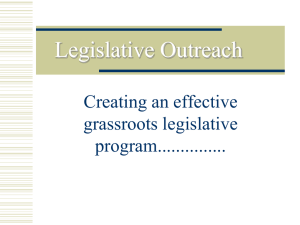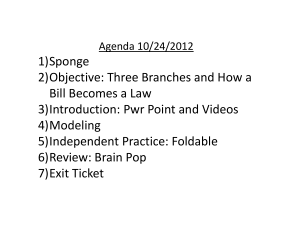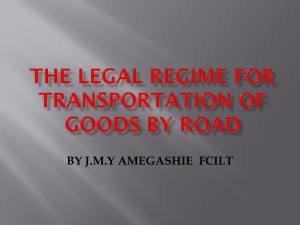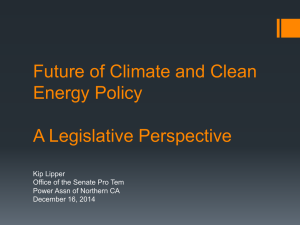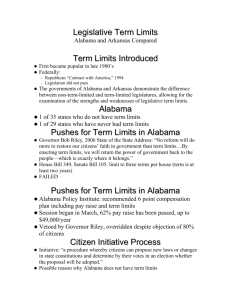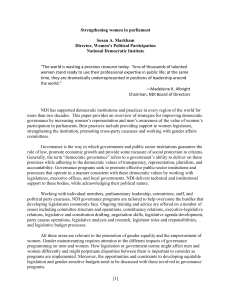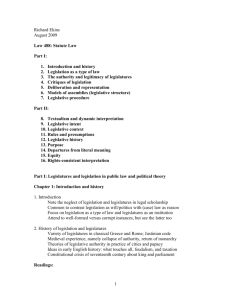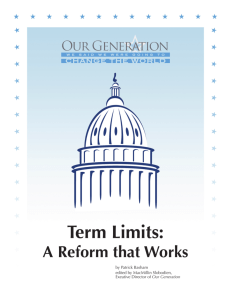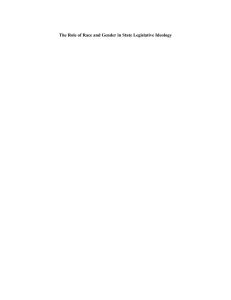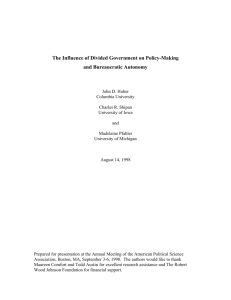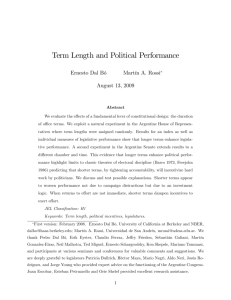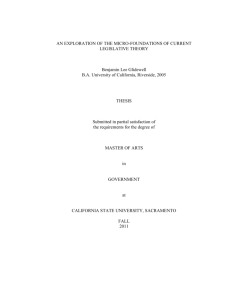The Art of Government Relations
advertisement
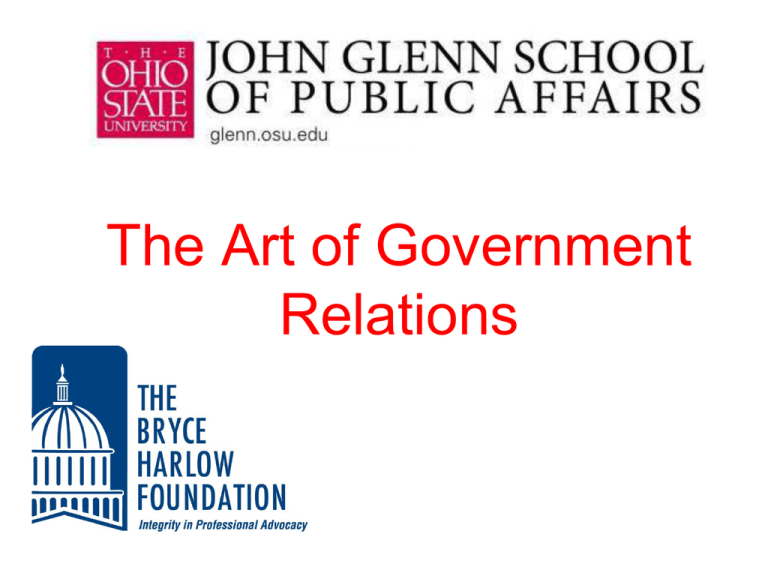
The Art of Government Relations Page # 1 Lobbying Lobbying is the practice of influencing decisions made by government. It includes all attempts to influence legislators and officials, whether by other legislators, constituents or organized groups… The term lobbyist has been traced to the midseventeenth century, when citizens would gather in a large lobby near the English House of Commons to express their views to members of Parliament. The Art of Government Relations • Lobbying is rooted in the U.S. Constitution which prohibits Congress from making laws that restrict the people’s right to “petition the Government for a redress of grievances.” • George Washington 1766 – Privy Council • Colonial Special Interests…publically funded roads for farmers… militia or army to protect New England farmers… navy to protect southern cotton trade routes 3 The Art of Government Relations The media has done a pretty good job demonizing lobbying,” says David Wenhold, president of the American League of Lobbyists. 4 The Art of Government Relations “Special interest groups are behind this…” • Is Greenpeace a special interest group? • Clean Coal? • Student loan recipients? • The Girl Scouts of America? • Farmers? 5 The Art of Government Relations In the past 10 years, 400 federal lawmakers and 5,400 legislative staff have left the federal government for private lobbying. During this time, only 605 lobbyists have moved into positions as congressional staffers. 6 The Art of Government Relations Government Relations Function • Knowledge of how the government works combined with issue expertise to provide issue education, and information to legislators and government officials that allows them to make informed decisions. • Sometimes we… – Support regulation – Oppose regulation – Seek to amend or change regulation 7 The Art of Government Relations 8 The Art of Government Relations The Regulatory Challenge • Total costs for Americans to comply with federal regulations reached $1.806 trillion in 2012. It is more than the GDPs of Canada or Mexico. • Last 20 years; 81,883 final federal rules have been issued. That’s more than 3,500 per year or about nine per day. • The ratio of regulations issued to laws passed by Congress and signed by the president – stood at 29 for 2012. 127 new laws translated into 3,708 new rules – or a new rule every 2 ½ hours. • Regulatory costs amount to $14,678 per family – 23 percent of the average household income. Source: US Chamber 9 The Art of Government Relations The Legislative Challenge • 2012 State Bills Introduced first 6 months = 155,450 – Enacted first six months 23,840 • 2012 Federal Bills Introduced first 6 months = 8,997 10 The Art of Government Relations SAMPLE ISSUES • Carbon Trading/Cap Trade • Credit Scores • Data Privacy - Identity theft • Farm subsidies • Foreclosures • Medical Conflicts of interest • Toxins • Undocumented workers • Waste medical, electronic, meth labs 11 The Art of Government Relations Legislators and Staff • Backgrounds – few come from the corporate world • Staff – how can one be an expert on all legislative issues under consideration? • Advocacy Groups • Unintended consequences 12 The Art of Government Relations Internal and external lobbyists External lobbyists • Understand and navigate the political landscape • Go from an outsider to less than an outsider • Can develop the legislative strategy based on reality. • Subject matter expert versus political expert 13 The Art of Government Relations First Priority - Positioning the Debate • The actual issue may not be mentioned – Campaign for human rights – Defense of marriage and the family • Take a complex concept and make it appear simple – Healthcare; sitting around the dinning room table – BP; tourists returning to the Gulf – Joe the Plumber 14 Fracking pollutes our ground water Fracking is safe with the right rules The Art of Government Relations Advocating for your industry/company • Unintended consequences • “6000% return for the credit card companies” • Appreciate your time senator… • “The ____ State Senate has never been concerned with the constitutionality of anything we have passed?” 17 The Art of Government Relations Maintaining highest ethical standards • “Can you get me NASCAR tickets” • “Senator what do you want?” • Dinner plus legal fees 18 The Art of Government Relations Grassroots, Grasstops, Astroturfing • Grassroots – formation of ideas and advocacy from the ground up. • Grasstops – involvement of individuals who are more influential; position in the community or position to the policy maker. • Astroturfing – appearing as a grassroots effort. 19 The Art of Government Relations Trends in Public Policy Debates - Astroturfing • Political, advertising, and public relations campaigns seeking to create the impression of being a spontaneous “grassroots” movement. • Techniques – few people attempting to appear as a mass movement. Letters to legislators, newspapers. Blogs, etc. • Examples – Healthcare Town Hall Meetings, Working Families for Wal-Mart, McDonalds (Japan) 20 The Art of Government Relations The Use of Coalitions • Issue coalitions, industry coalitions • Pool resources, funds, analysis • Sends a message to legislators • Opening closed doors • Protect corporate reputation behind the coalition – “tip of the spear” • The coalition becomes the lightening rod. 21 Think Tanks - Public Policy Institutes • Non-profit research organizations engaged in public policy analysis and research • Often, advocate solutions, but do not lobby • Some are strictly nonpartisan, researching policy issues without regard to political outcomes • Others see their function to provide intellectual support for politicians or political parties. Top Ten U.S. Think Tanks 1. Brookings Institution 2. Council on Foreign Relations 3. Carnegie Endowment for International Peace 4. Center for Strategic and International Studies 5. RAND Corporation 6. Cato Institute 7. Heritage Foundation 8. Woodrow Wilson International Center for Scholars 9. Peterson Institute for International Economics 10. American Enterprise Institute Protecting Corporate Reputation Public Relations Firms and Media Consultants • Managing the flow of information between a corporation and the public • Help corporations shape and position their media messaging and shape public perception • Public policy issues (poling, focus groups) • Damage control • What combination of media to use • Social media 24 The Art of Government Relations It Is All About Getting Reelected • PACs • Corporate Contributions • Access 25 The Art of Government Relations Corporate Political Action committee - PAC • Effective means for employees and stockholders to join together to pool their contributions to further common political and legislative interests. • There are over 1,500 corporations, including many Fortune 500 companies, that operate federal PACs. • Corporate PACs can contribute up to $5,000 to a federal candidate's primary election, $5,000 to the same candidate's general election, and $5,000 per year to a federal officeholder's "Leadership PAC." Leadership PACs are created by Members of Congress to help fund their colleagues' campaigns (200 active Leadership PACs). 26 The Art of Government Relations For a corporation, government regulation can… • Provide a competitive advantage – Play to a core competency – Raise barriers to entry – best in class practices – Provide incentives to protect or grow your market • Competitive disadvantage – Overlay costs through compliance – Restrict the commercial viability of the market 27 The Art of Government Relations Corporate Calculus: Government Relations $$ < Litigation $$$$ • Studies validate that Government Relations provides a superior return on investment. 28 Porter Industry Analysis Competitors Employees Alt. Competitors Industry Customers Government Regulation 29 Government Relations Process Flowchart Legislative Regulatory Initiatives Legislative or regulatory initiatives that could impact HRB operating models • IRS – Treasury • State Revenue Departments • Federal legislation • State legislation • Advocacy Groups Government Relations Request Legal and Business Segment legislative review • New issue - need to take to Sr. Management for consensus response. Develop Government Relations Policy Positions • Combine inputs • Resolve inconsistencies • Formulate strategies • Develop legislative tactics that insure success - Talking points - Amendment language Legal New Issue Legal Review • What are the legal Issues? • Suggested amendment Language Compliance Risk Management The Tax Institute Operations/Compliance Review • How would this impact operating models? • Quantify impact? • Impact on new products and services? • Impact HRB versus competitors? • Assign priority rating Senior Management Develop a Consensus for a Corporate Strategic Response • Review inputs from Government Relations, Legal, Operations, Risk Management and The Tax Institute. • Reach a consensus on a corporate goal for this issue. Regulatory Roadmap Corporate Strategic Plan Government Relations Playbook • Issue • Background • Position • Strategies & Tactics • Opposition - Positions - Strategies - Tactics Annual Operating Plans for businesses New Product/Service business case Legislative Updates • Weekly or monthly • Updating legislation and regulatory issues • Updates on specific legislative issues of high importance. The Art of Government Relations The Roll of Corporate Government Relations • Insure that senior management understands the risks or potential rewards – GR Updates – Senior management reviews • Help build a corporate consensus and develop legislative strategies in support of the consensus • Quantify the GR value-add 31 The Art of Government Relations Touch-points for Corporate Government Relations • Strategic Plan – Regulatory Roadmap • Annual Plan – Short term impact • Business Cases – Products and Services • Reputational - Crisis Management • Investor Relations • Public Relations 32 The Art of Government Relations S.566: Creates a Financial Product Safety Commission, to provide stronger protections and better information in connection with consumer financial products and to provide more regulatory protections S.414: Amends the Consumer Credit Protection Act, to ban abusive credit practices, enhance consumer disclosures, and protect underage consumers. S.235: Establishes fair and transparent practices relating to the extension of credit under an open end consumer credit plan. S.255: Empowers the States to set the maximum annual percentage rates applicable to consumer credit transactions. S.500: Establishes a national usury rate of 36% for all consumer credit transactions. H.1368: Amends the Internal Revenue Code to require the Secretary of the Treasury to establish an Auto File Program which will provide income tax forms 33 containing pre-filled information.
